Eight Bells: Harry Anderson
Published on May 11th, 2020
Henry Hill Anderson Jr passed away peacefully on the morning of May 11, 2020 in Mystic, Connecticut. Commodore Anderson was a young man of 98 years. In his beloved Latin, Harry proved “Quam bene vivas refert non quam diu….it is how well you live that matters, not how long.” Harry lived an incredibly full and generous life for almost a century.
“Harry”, as he was known to his family, friends as well as by those who knew him by his legend, was a man of enormous intellect, inspiration, leadership, and inexhaustible energy. Recognized by many as a leader in international sailing circles for more than 60 years, Harry was also a mentor to many, a champion of experiential learning, and an historian of rare equal.
An adventurer from a young age, Harry sailed his first Newport-Bermuda Race at 15 years. Harry’s passion for the sport of sailing took him along many paths; from sailing as a child on Six Meters in the 1930s, to introducing the Finn dinghy class in the United States in the 1950s with his friend Glen Foster, to serving on the America’s Cup Selection Committee in the 1970s and 80s. Harry was the Commodore of the New York Yacht Club during the club’s last successful defense of the America’s Cup in 1980.
Harry’s achievements and contribution to the sport may never see an equal. He was a very successful racer having collected dozens of victories over the years sailing his many boats of all sizes and varieties. He was a stalwart shipmate whose seamanship skills were exemplary. Many Collegiate and Frostbite sailors compete on the “Harry A.” race course, a unique dinghy racing course created by the imaginative Harry A.
To the many who had the privilege of racing or cruising or acting in an official manner with Harry, his greatest delight was derived from the camaraderie and friendships that came from the sport he devoted much of his life to. There is nary a noteworthy body of water upon which Harry did not compete or officiate, or a smart waterfront tavern where he did not raise a glass.
Communicator, prolific writer of countless notes, problem solver, philanthropist, and fun-loving friend, “godfather by proxy” to legions and Uncle to a very special few, everyone – from waterfront rascals and collegiate sailors to Kings and Princes, gold medalists, sultans, and presidents too – knew him as their cheerful friend Harry.
His connections were limitless. One would never be surprised to hear a person’s name come up in passing only to have Harry say, “he’s my second cousin twice removed.” His travels were limitless too, whether sailing a clipper ship in the Windward Islands, competing on the famed Six Metre “Goose” in the Solent, or working on his beloved Boulaceet Farm in Cape Breton, Harry was rarely a sedentary soul.
During those travels, Harry would never miss a chance to drop in and visit his many nieces and nephews and give them his whole hearted support in their endeavors.
Born June 2, 1921, in New York City, to Henry H. Anderson Sr and Helen James Anderson, Harry had early distinguished Colonial antecedents, namely his great-grandfather Henry Hill Anderson, counsel for the City of New York in the 1800s.
Harry’s great grandfather, Oliver Burr Jennings, was a Forty-Niner whose ancestor Joshua Jennings settled in Hartford, Connecticut in 1645, concurrently with Jehue Burr, great grandfather of Col. Aaron Burr of whom Henry H. Anderson Jr. is a collateral descendant (both families settled in Fairfield, Connecticut). Harry is also a descendant of William James of Scituate, Massachusetts, who moved to Newport, Rhode Island, ca 1680.
Brought up in Oyster Bay, New York, Harry was also the Commodore of Seawanhaka Corinthian Yacht Club, Commode of the Revolting Colonist Outpost, and an honorary member of yacht clubs extending from Long Beach, California to Helsinki, Finland. He was a flag officer of nine different yacht clubs.
A graduate of Yale, Harry completed his studies there in three and a half years so he could join the United States Army in 1943. He served in World War II as a Field Artillery captain in Patton’s Third Army having landed at Normandy, D-Day plus 30. He was a part of Patton’s historic campaign which helped to liberate Europe from the Nazi’s. After the war Harry got his Law degree from Columbia University, though he did not follow in the Anderson family tradition to practice law.
Harry always saw sailing as an educational experience and tirelessly supported and promoted it, whether as a yacht club officer, U.S. Sailing director, college sailing advocate, Congressional Cup judge, financial supporter, or advisor to many sailing organizations. Harry was actively associated with numerous educational institutions including Tall Ships America, University of Rhode Island, Yale University, and the U.S. Naval Academy. Anderson chaired US Sailing’s Appeals Committee for 25 years and had a hand in writing a good part of the racing rules of sailing during that tenure.
Harry was a devoted, life-long researcher driven by a compelling curiosity about subjects ranging from the location of Captain Cook’s ships on the bottom of Newport Harbor, to the lives of his illustrious antecedents. He participated in comprehensive publications and films about railroad magnate Arthur Curtiss James (another collateral ancestor), and America’s third vice president, Aaron Burr. He was determined that those forgotten (James) or maligned (Burr) be accurately documented, and assigned their proper places in history.
Anderson’s philanthropies included the Ransom Everglades School in Coconut Grove, Florida, his alma mater, where he was trustee for life. His name appears on the school’s gymnasium and sailing center. He was long involved as a champion of Yale (class of ’42) and University of Rhode Island sailing programs, having donated several fleets of boats, raised funds for sailing facilities, and as an advisor.
A longtime resident of Newport, R.I., Commodore Anderson sat on the boards of Tall Ships America, Seamen’s Church Institute, the US Naval War College, the Rhode Island Marine Archeology Project, the Aaron Burr Association, the Fales Committee at the United States Naval Academy, and the Foundation for the Preservation of Captain Cook’s Ships.
Always a volunteer himself, no one worked harder. Anderson had a subtle way of snapping the whip that not only produced results, but brought him respect and admiration. He was often the silent person at the table whose succinct conclusions solved problems. His work continued well beyond the usual retirement age, including being a founding member of the University of Rhode Island Sailing Advisory Council when he was in his 90’s and even last month working on his latest project, a book about William Rockefeller.
Harry’s awards and honoraria include Intercollegiate Sailing Association Hall of Fame; National Sailing Hall of Fame; Doctor of Laws from the University of Rhode Island (2009); The Beppe Croce Trophy (International Sailing Federation and International Yacht Racing Union); the Nathaniel Herreshoff Trophy (U.S. Sailing Foundation); Lifetime Service Award (Inter-Collegiate Sailing Association); Congressional Cup Scarlet Blazer; 33rd Congressional Cup (dedicated to HHA Jr); Post Captain’s Trophy (North American Station, Royal Scandinavian Yacht Clubs & Nylandska Jaktklubben); Bronze Star U.S. Army; Richard S. Nye Trophy (Cruising Club of America); Henry H. Anderson, Jr. Sail Training Scholarship Fund (American Sail Training Association); Lifetime Achievement Award (American Sail Training Association); W.P. Stephens Award (Mystic Seaport); Henry H. Anderson, Jr. Memorial Library (Seamen’s Church Institute).
Over the years and right up until the end, Harry would frequently write notes on an infinite number of topics, often on re-purposed paper. It is quite likely that many who are reading this tribute to Harry are smiling as they may have received one or many such notes through the years. Some were pointed in its message, others were anecdotal in their reference often quoting classic poetry and prose to make their point or deliver the message. All were something to behold and cherished upon reflection.
Here is one of Harry’s notes to a friend in 2012:
“Life’s pleasures are to be enjoyed in moderation, and apropos the cruising man, while we are not always borne with swelling sails before a blowing wind, neither do we drag out life struggling with headwinds; or befitting the fortune of the racing man ‘behind the foremost, ever before the foremost’. One snatches one’s enjoyment of the brief and pleasant hours like a school boy in the spring holidays.”
Harry Anderson’s was a life well lived.
Harry was pre-deceased by his beloved brother Jim and is survived by his brother, David, and 45 nephews, nieces, and great nephews and nieces.
Given the restrictions of COVID-19, there will be a small family gathering to lay the Commodore to rest. A memorial “gam” of suitable scale and good cheer will be scheduled when the circumstances allow for Harry’s friends to raise a glass to his memory and legacy.
Harry was very generous to causes he believed in. All were focused on the development of young people through experiential learning from being on the water. Gifts in lieu of flowers can be sent any of the causes that were important to Harry:
• Yale Sailing Association, Ray Tompkins House, 20 Tower Parkway, New Haven, Ct. 06511
• Ransom Everglades School, Attn: Julie Rosenfeld, 3575 Main Highway, Coconut Grove, FL 33133
• Henry H. Jr Anderson Sailing Endowment, The University of Rhode Island Foundation, PO Box 1700 Kingston, RI 02881
• Tall Ships America, 221 3rd Street, Building 2, Suite 101, Newport, RI 02840
Notes of condolences and reflections can be sent to:
New York Yacht Club, Harbour Court
c/o General Managers Office
5 Halidon Court
Newport, RI 02840


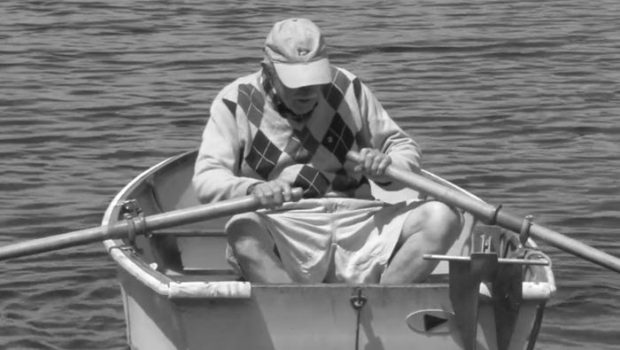
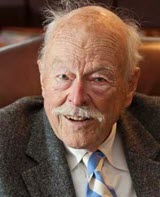



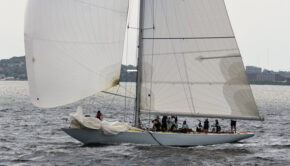
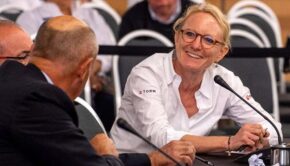
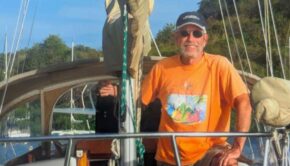
 We’ll keep your information safe.
We’ll keep your information safe.